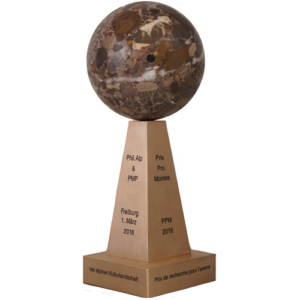ProMontesPrize 2018
For the future of the alpine cultural landscape

The ProMontes Prize of the Swiss Foundation for Alpine Research, SSAF, was awarded on Thursday, March 1, 2018 in Fribourg, during the Phil. Alp Conference of the Interacademic Commission for Alpine Studies, ICAS.
The winner is Denise Binggeli*, student at the Institute for natural, landscape, environmental conservation of the University of Basel.
In her Master’s thesis regarding the “successful recultivation of the abandoned terraced landscape of the Tessin Alps” (“Erfolgreiche Wiederbewirtschaftung von verlassenen Terrassenlandschaften in den Tessiner Alpen”), Miss Binggeli demonstrated that the initiatives of local Tessin organizations to revitalize terraced vineyards and grass landscapes are able to stop further reforestation, renew landscape diversity, and increase biodiversity. Miss Binggeli studied the extent to which the biodiversity of vascular plants on terraces that have been in constant use for 100 years differs from that on terraces that have only been recultivated for 10-15 Jahren in the Maggia, Onsernone, & Rovana valleys. Her encouraging results showed that there was practically no difference in plant diversity – provided that the terraces did not lie fallow for too long as otherwise the characteristic meadowland varieties are displaced by shade-tolerant varieties. Naturally, other types of organisms such as insects, reptiles, and birds also benefit from this revitalization of the traditional, extensively cultivated vineyards, meadows, and pastures in the Tessin Alps.
With her research, Miss Binggeli provided scientific proof that recultivation of abandoned areas can prevent the increased expansion of the forest and thus prevent a decrease in plant diversity.
The ProMontes Prize, with a value of 3,000 Francs recognizes this research as an important contribution for safeguarding the future of the alpine cultural landscape. Upon application, an additional 20,000 Francs will be granted for further, project-related research.
The Swiss Foundation for Alpine Research feels compelled to specifically promote the research for safeguarding the future of the culture-based alpine landscapes because they are not taken into account sufficiently by the established conservation initiatives, in contrast to the natural forest and moor landscapes.
Since the 20th century, many rapid upheavals have also occurred in the Alpine region. For example, the mountain forest was largely able to recover from the ruthless exploitation in the 19th century and the grassy landscape of the alpine level also benefited from conservation measures. On the other hand, the traditional cultural landscape has been suffering up to today from a wide variety of development trends of recent decades. With the development of tourism and transport, new job opportunities have arisen for the mountain population which have made landscape conservation negligible. However, the biggest threat to the alpine cultural landscape and to the third of its biodiversity spectrum which is dependent on it arises from the existence or non-existence of agriculture itself. On the one hand, its intensification of profitable locations leads to the decline of species. On the other hand, the management task also leads to the decline of species because of the competitive reforestation where the lack of jobs and public service force migration.
Safeguarding the future for the alpine cultural landscape requires a whole set of measures; from innovative private commitments to paving the way through legislation.
The Swiss Foundation for Alpine Research is hoping that this set of measures can be supplemented with new insights from junior research.
In the interests of the objective of the ProMontesPrize:
Alpine Biodiversity instead of Alpine Fallow Land!